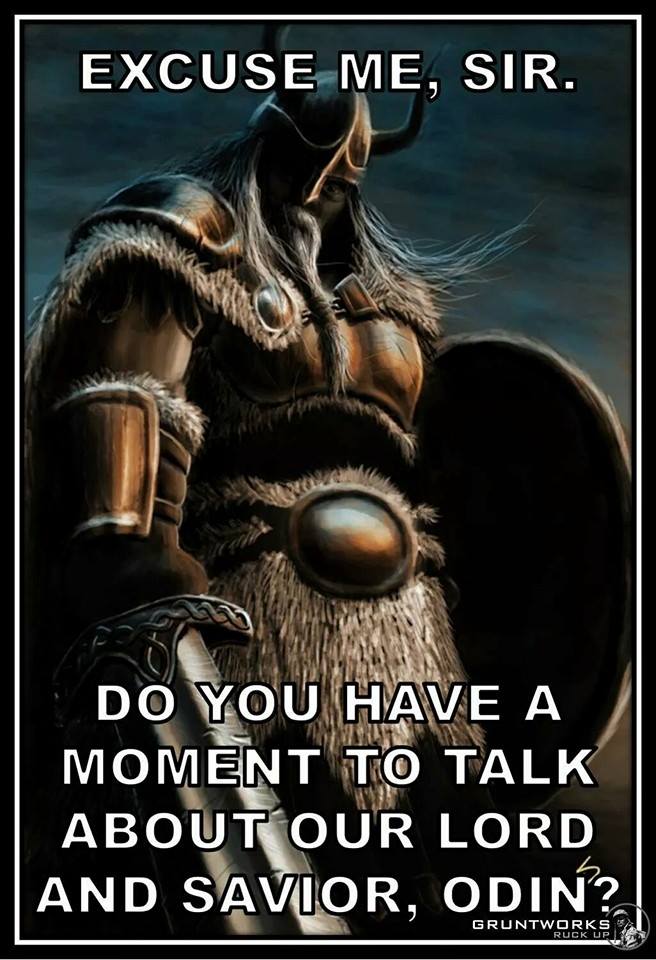 As a follower of Tyr, I have a grudging respect for Loki. So much so that I even have a place for him on my altar. Loki as a chaos god shows up constantly in my life — and probably your life, too. And despite all the naysayers claiming that no one ever worshiped Loki, I suspect ancient Heathens did acknowledge him at blots and other religious functions. And I believe that people did worship him as much as other gods. Let me explain why.
As a follower of Tyr, I have a grudging respect for Loki. So much so that I even have a place for him on my altar. Loki as a chaos god shows up constantly in my life — and probably your life, too. And despite all the naysayers claiming that no one ever worshiped Loki, I suspect ancient Heathens did acknowledge him at blots and other religious functions. And I believe that people did worship him as much as other gods. Let me explain why.
Loki’s Bad Rap
Loki as a chaos god has without a doubt gotten a bad rap from the whole death of Baldr thing and leading the forces of chaos at Ragnarok. The fact that he had monstrous children with Angrboda seems to confirm it too. Both Fenrir and Jörmungandr are indeed dangerous beasts. Hel, while her followers would argue against her being a monster, some Heathens certainly considered at least frightening, if not a demon-like creature. Seeing a woman half skeleton and half flesh is, after all, pretty creepy in most contexts.
Loki as a Catalyst for Change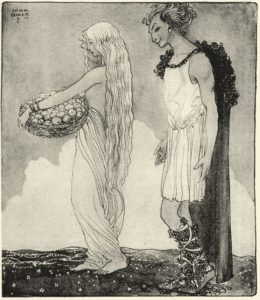
That aside, Loki is the gods’ catalyst for change. He plays tricks on them — some tricks not so nice — but in the end, most of his behavior benefits the gods. Cutting Sif’s hair is a prime example. First, you have to wonder what Loki was doing in Sif’s bedroom (something mentioned in Loki’s Flyting). Once the gods caught Loki, he not only repaired the damage by giving Sif new hair, but gained other treasures for the gods.
Loki is the prime mover and shaker in Asgard. If he did not constantly get into trouble, the Aesir and Vanir would have stagnated. They wouldn’t have gotten Asgard for free. Odin would not have Slepnir. The gods wouldn’t have Skadi within their midst. Thor would not have Mjöllnir, Freyr wouldn’t have Skíðblaðnir and Gullin-börsti, and Odin would not have Gungnir and Draupnir.
Loki as a Malicious God
 Loki shows his malicious side both in the death of Baldr and in Lokasenna (Loki’s Flyting). It’s interesting that he isn’t bound because he caused Baldr’s death, but because he insulted the gods and goddesses at a feast. As an aside, does anyone else see a disparity here? Sure, he kills Aegir’s servant, but that’s not why his children are killed and he’s tied up with a venomous snake dripping poison overhead. Granted, the punishment may be for all his troublemaking and this might be the last straw, but seriously?
Loki shows his malicious side both in the death of Baldr and in Lokasenna (Loki’s Flyting). It’s interesting that he isn’t bound because he caused Baldr’s death, but because he insulted the gods and goddesses at a feast. As an aside, does anyone else see a disparity here? Sure, he kills Aegir’s servant, but that’s not why his children are killed and he’s tied up with a venomous snake dripping poison overhead. Granted, the punishment may be for all his troublemaking and this might be the last straw, but seriously?
Loki is punished because he speaks the truth, albeit twisted to hurt. But sometimes the truth hurts, and it shows the foibles and failings of even the mightiest of gods. So, even though his actions aren’t justifiable, it fits perfectly for Loki as a chaos god.
Is Loki Good or Bad?
 At this stage, you may be wondering if Loki is good or bad. If you take the simplistic route, you look at everything bad Loki has done. Loki killed Baldr through Hodur. He disallowed Baldr to return to Asgard. He sired three creatures which will bring about Ragnarok. Loki then killed Aegir’s servant and insulted the gods. The list goes on and on.
At this stage, you may be wondering if Loki is good or bad. If you take the simplistic route, you look at everything bad Loki has done. Loki killed Baldr through Hodur. He disallowed Baldr to return to Asgard. He sired three creatures which will bring about Ragnarok. Loki then killed Aegir’s servant and insulted the gods. The list goes on and on.
If you’re a Lokean, you might argue that Loki has done good things as mentioned in this post above. You might point out how the Fenrir was set up and that Ragnarok happens because the gods’ actions caused it. Furthermore, you might point out that the Aesir and Vanir brought Ragnarok on them because they threw Loki’s children under the proverbial bus.
So, which side is right?
Loki as a Chaos God
Actually, both sides are right and wrong at the same time. The reason is that Loki is a complex being, although obviously a chaos god and a trickster. He is the archetypal trickster who metes out both good and bad through his love of causing chaos wherever he goes. He takes joy in shedding light where everyone else wants the situation in the dark, and he hates the status quo, whether it is good or bad. He stirs the pot, because that’s what he does. Even if the pot suits everyone else, it tastes bland to him.
Loki can be almost demonic when he is looking for vengeance, due to whatever slight he sees, real or imagined. Ragnarok is as much his doing as anything else. Why? Because it is change. It will destroy what was and will replace it with something else.
Capricious beyond belief, this consummate troublemaker is one that can’t leave well enough alone. He is happy to hand out good and bad, as long as it suits him. With that kind of behavior, you have to wonder if he’s worth bothering with, but ignoring him is the worst thing you can do. He’ll make it a point to stir up trouble.
Not Evil, Just Misunderstood
 Oddly enough, I’ve discovered that if you stay on good terms with Loki, he will aid you whenever he can. But his aid is often fraught with chaos, and your life will take a turn toward the surreal should you decide to make him your primary god. It has been my and others’ experience that Loki will help you when he can, but chaos will linger with you as a type of payment. For every good thing, you may have a bad thing happen. In most cases, Loki will help you, but don’t be surprised is there is a catch. (With most of the Northern gods, there is always a catch somewhere.)
Oddly enough, I’ve discovered that if you stay on good terms with Loki, he will aid you whenever he can. But his aid is often fraught with chaos, and your life will take a turn toward the surreal should you decide to make him your primary god. It has been my and others’ experience that Loki will help you when he can, but chaos will linger with you as a type of payment. For every good thing, you may have a bad thing happen. In most cases, Loki will help you, but don’t be surprised is there is a catch. (With most of the Northern gods, there is always a catch somewhere.)
My god, Tyr, is pretty much the opposite of Loki. Where Loki is a force of chaos, Tyr is a god of law. It’s interesting because Tyr recognizes that while they are opposites, you can’t have one without the other. Tyr was the only god who took care of Fenrir and paid the sacrifice of his hand to the wolf when the gods decided that Fenrir must be bound. Like Loki, Fenrir is a force of chaos. You can’t have law without chaos.
Did Our Ancestors Worship Loki?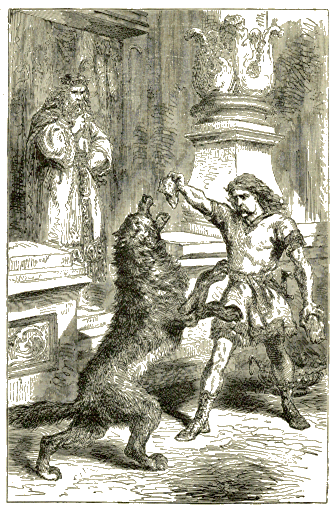
The question of whether our ancestors worshiped Loki is somewhat academic. We don’t have archaeological proof that Loki was worshiped, but then, we don’t have a lot of evidence that certain goddesses such as Eostre existed either. We can speculate that Tyr’s consort was Zisa, but there isn’t really anything that backs it up.
I suspect that because Loki was considered one of the Aesir, he was worshiped in some fashion. After all, many kings traced their lineage back to Jotunn, so Rokkatru isn’t far off from that. At the very least, I suspect that he wasn’t ignored so that he wouldn’t cause trouble.
Isn’t Loki Still Tied to the Rock with a Serpent Overhead?
How can we have people worshiping Loki and Fenrir when both are bound up? This is an interesting point, and I have four possible suppositions as to how Loki and Fenrir can exist bound and yet unbound. Here are my four possible conclusions:
- The Loki killing Baldr, the Lokasenna, and the binding of Fenrir stories are prophetic and have not come to pass. (Unlikely)
- The stories are metaphors for things that have happened already and when talking about binding, it may suggest a controlling of power — or in Tyr’s case, a loss of power — rather than an actual physical binding.
- Ragnarok has already happened at least once. That means that our gods exist, but in newer forms.
- The gods are many faceted and capable of being in several places at once. This, oddly enough, works when you consider quantum theory. So, Loki may be tied to a rock in one place and free in another. (Yeah, quantum theory is fucked up.)
Seeing as I’ve had dealings with the god of chaos, I can say that he is very much around. Plus, we have plenty of chaos in our world — binding him did no good on that score.
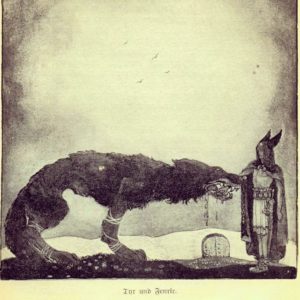 Why Loki is a Powerful God
Why Loki is a Powerful God
Why is Loki a powerful god? Think about it. He controls chaos and randomness. Without him, the universe would not work the way it does. When things happen by chance — good or bad — that is the domain of Loki. When we think about suddenly finding money on the road while walking, or missing a bus or plane because something held you up, or getting in a car accident when you were not at fault, that’s Loki working in your life.
Loki is the god of entropy as well. That means that as chaos and randomness continues, so order breaks down. That is, in essence, what many scientists predict will happen to our universe as it ends. It goes cold as it dies as everything breaks apart. A powerful god, to be sure.
A Poem to Loki
I found this on the Interwebs and thought I’d share it with you. Not my work, but I do have permission to use it.
Full Cycle
The cave is dark, as the one where he bested Andvari.
The gold he got freed the Aesir from bonds.
Now he lies fettered himself.
He remembers
Pranks and jests
– dangerous, granted –
Showing them life
without masquerade of youth,
or jewels, or hair.
Drip.
They took his gifts
but they never learned
his secrets of change
and looking at unpleasant truths.
Drip. The bowl fills.
How they put everything
they could not deal with
out of sight, or life:
Ymir. The giants. His Ironwood-get.
Drip.
They could not face death.
Even some humans did better.
The bowl fills to the brim,
surface taut as a bowstring-
Drip.
Poison flows
Balder´s blood
rushing
tears of nine worlds
gushing
the stream where they caught him
Snake spit burns
like Asgard´s curses,
not this!
Tormented, he strains
to break bonds
with prophecy´s force
Midgard trembles
– maybe this time? –
Sigyn hurries
Will she return…?
Relief.
Now it´s just the cave, and the darkness,
and three stones cutting his back,
and the memories they share.
Drip.
A tear Sigyn sheds.
— Full Cycle Poem © 2007 Michaela Macha. This work (entitled Full Cycle) by Michaela Macha (www.odins-gift.com) is licensed under a Creative Commons Attribution-NoDerivatives License.
 I read about an interesting seidr that had Loki giving advice to everyone. Now, I am rather skeptical about people being skinridden by gods, but the message sounded like it could’ve been from Loki–at least the Loki I know. So, I’m going to keep my mind at least somewhat open when it comes to that seidr.
I read about an interesting seidr that had Loki giving advice to everyone. Now, I am rather skeptical about people being skinridden by gods, but the message sounded like it could’ve been from Loki–at least the Loki I know. So, I’m going to keep my mind at least somewhat open when it comes to that seidr. I’ve gotten advice from Loki, often because Tyr didn’t have advice for me. Loki’s advice is…well…, not necessarily the best. Sometimes he’s made things worse. So, I don’t necessarily follow his advice. Because he’s a chaos god, you can expect your life to be interesting if he shows up.
I’ve gotten advice from Loki, often because Tyr didn’t have advice for me. Loki’s advice is…well…, not necessarily the best. Sometimes he’s made things worse. So, I don’t necessarily follow his advice. Because he’s a chaos god, you can expect your life to be interesting if he shows up.
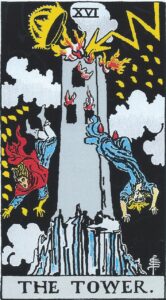

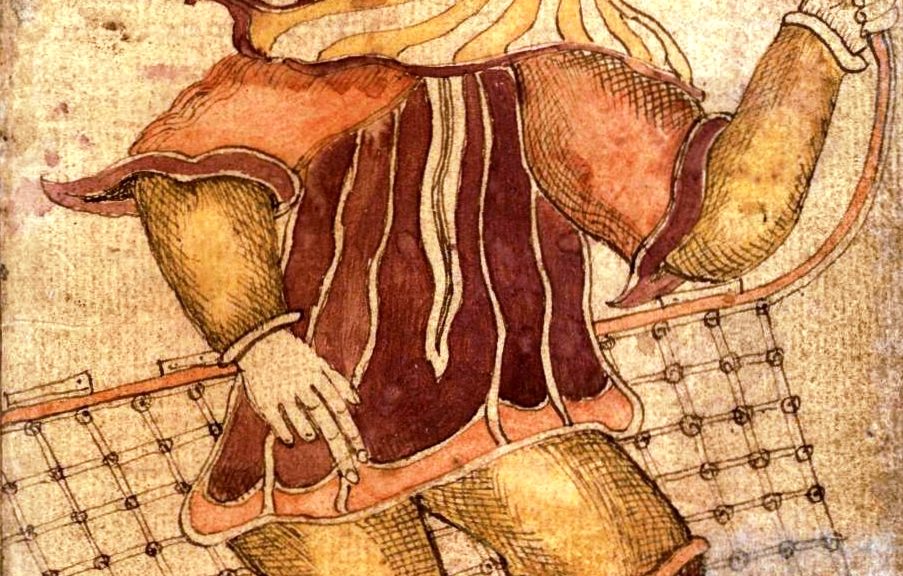

 As a follower of Tyr, I have a grudging respect for Loki. So much so that I even have a place for him on my altar. Loki as a chaos god shows up constantly in my life — and probably your life, too. And despite all the naysayers claiming that no one ever worshiped Loki, I suspect ancient Heathens did acknowledge him at blots and other religious functions. And I believe that people did worship him as much as other gods. Let me explain why.
As a follower of Tyr, I have a grudging respect for Loki. So much so that I even have a place for him on my altar. Loki as a chaos god shows up constantly in my life — and probably your life, too. And despite all the naysayers claiming that no one ever worshiped Loki, I suspect ancient Heathens did acknowledge him at blots and other religious functions. And I believe that people did worship him as much as other gods. Let me explain why.
 Loki shows his malicious side both in the death of Baldr and in Lokasenna (Loki’s Flyting). It’s interesting that he isn’t bound because he caused Baldr’s death, but because he insulted the gods and goddesses at a feast. As an aside, does anyone else see a disparity here? Sure, he kills Aegir’s servant, but that’s not why his children are killed and he’s tied up with a venomous snake dripping poison overhead. Granted, the punishment may be for all his troublemaking and this might be the last straw, but seriously?
Loki shows his malicious side both in the death of Baldr and in Lokasenna (Loki’s Flyting). It’s interesting that he isn’t bound because he caused Baldr’s death, but because he insulted the gods and goddesses at a feast. As an aside, does anyone else see a disparity here? Sure, he kills Aegir’s servant, but that’s not why his children are killed and he’s tied up with a venomous snake dripping poison overhead. Granted, the punishment may be for all his troublemaking and this might be the last straw, but seriously? At this stage, you may be wondering if Loki is good or bad. If you take the simplistic route, you look at everything bad Loki has done. Loki killed Baldr through Hodur. He disallowed Baldr to return to Asgard. He sired three creatures which will bring about Ragnarok. Loki then killed Aegir’s servant and insulted the gods. The list goes on and on.
At this stage, you may be wondering if Loki is good or bad. If you take the simplistic route, you look at everything bad Loki has done. Loki killed Baldr through Hodur. He disallowed Baldr to return to Asgard. He sired three creatures which will bring about Ragnarok. Loki then killed Aegir’s servant and insulted the gods. The list goes on and on. Oddly enough, I’ve discovered that if you stay on good terms with Loki, he will aid you whenever he can. But his aid is often fraught with chaos, and your life will take a turn toward the surreal should you decide to make him your primary god. It has been my and others’ experience that Loki will help you when he can, but chaos will linger with you as a type of payment. For every good thing, you may have a bad thing happen. In most cases, Loki will help you, but don’t be surprised is there is a catch. (With most of the Northern gods, there is always a catch somewhere.)
Oddly enough, I’ve discovered that if you stay on good terms with Loki, he will aid you whenever he can. But his aid is often fraught with chaos, and your life will take a turn toward the surreal should you decide to make him your primary god. It has been my and others’ experience that Loki will help you when he can, but chaos will linger with you as a type of payment. For every good thing, you may have a bad thing happen. In most cases, Loki will help you, but don’t be surprised is there is a catch. (With most of the Northern gods, there is always a catch somewhere.)
 Why Loki is a Powerful God
Why Loki is a Powerful God